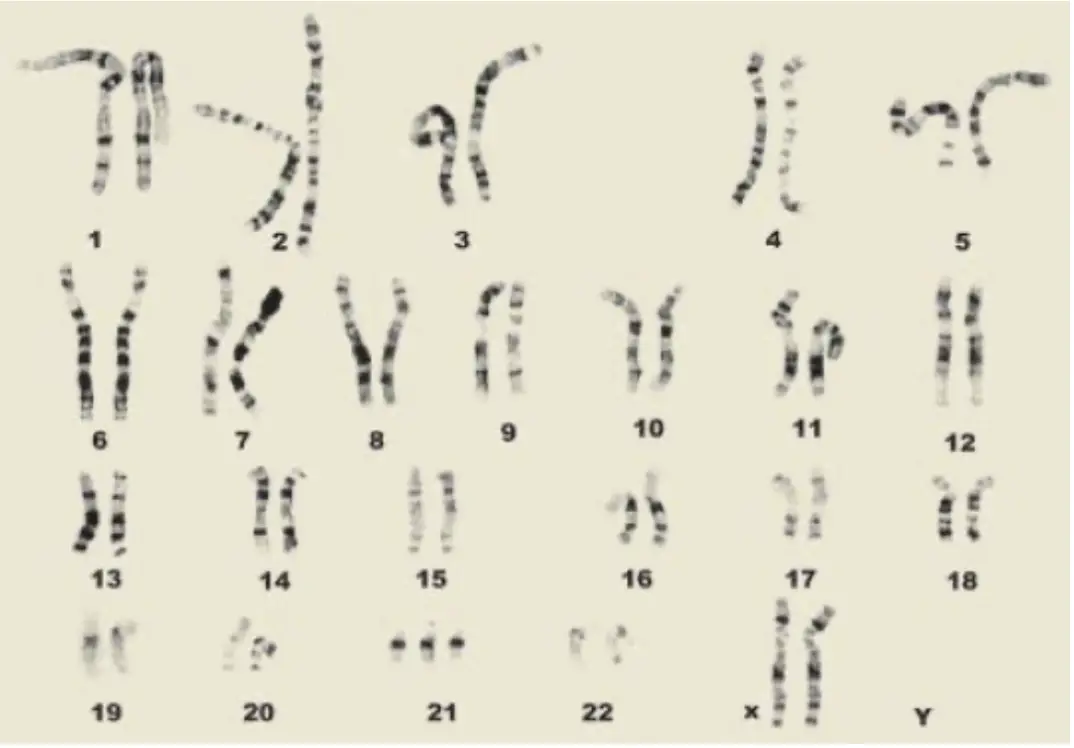What is
Down Syndrome?
Down Syndrome (DS) is also called as Trisomy 21.It is a chromosomal disorder in which the affected individual has one extra chromosome. Every human being has 23 pairs of chromosomes ,i.e 46 chromosomes.
In people with Down Syndrome, the chromosome pair number 21 has an extra third chromosome instead of two so that the total number of chromosomes is 47 instead of the normal 46.
Even though there is no history of Down syndrome in the family there is a chance that the child can be affected.

What causes Down syndrome?
All people with Down syndrome have an extra, critical portion of chromosome 21 present in all or some of their cells.
The cause of the extra full or partial chromosome is still unknown.
Age is the only factor that has been linked to an increased chance of having a baby with Down syndrome resulting from nondisjunction or mosaicism. However, due to higher birth rates in younger women, 51% of children with Down syndrome are born to women under 35 years of age.
There is no definitive scientific research that indicates that Down syndrome is caused by environmental factors or the parents’ activities before or during pregnancy.
What are the characteristics of Down’s syndrome?
Children with Down Syndrome will all have some degree of learning difficulty. Many may be able to go to ordinary schools and lead semi independent lives, but others will need full-time care with a normal life expectancy.
Individuals with Down syndrome commonly have distinct physical features, unique health issues, and changes in cognitive development.
Physical features
Some commonTrusted Source physical characteristics of Down syndrome can include:
- eyes that slant upward
- skin folds on the inner corner of the upper eyelid
- white spots on the iris
- low muscle tone
- small stature and a short neck
- a flat nasal bridge
- single, deep creases across the center of the palms
- a protruding tongue
- small hands and feet
Developmental delays
People with Down syndrome usually have cognitive development profiles that suggest mild to moderate intellectual disability. However, cognitive development and intellectual ability are highly variable.
People with Down syndrome also experience learning difficulties that lead to developmental delays. A person with Down syndrome has a specific pattern of cognitive and behavioral features. These differ from what is seen in typically developing children and children with other causes of intellectual disability.
Children with Down syndrome often reach developmental milestones a little later than their peers. They may be slow to sit, turn over, and stand.
People with Down syndrome may also experience:
- difficulties with attention
- a tendency to make poor judgments
- impulsive behavior
With engagement and regular therapy, most people with Down syndrome can attend school and become active members of the community.
Health issues
Sometimes, general health problems can affect any organ system or bodily function. About 40% of all people with Down syndrome have a congenital heart defect.
There may also be a higher risk of:
- congenital hypothyroidism
- hearing loss
- seizures
- vision disorders such as cataracts
- decreased muscle tone
Children with Down syndrome are also more likely to develop some infections, such as:
- respiratory infections
- middle ear infections
- tonsillitis
- pneumonia
Why should we test for Down’s syndrome?
It is the commonest cause of global developmental delay in children and can have a major social, financial and emotional impact on a family.
How is Down syndrome diagnosed?
There are two categories of tests that your doctor can offer
– screening tests and
– diagnostic tests.
A screening test only tells you whether or not you are at particularly high risk of having a baby with Down’s Syndrome. This does not confirm the chromosome status of your baby.
A diagnostic test can give you a definite diagnosis, but also carries a small risk of miscarriage.
What are the screening tests available?
1.Ultrasound Screening
- Nuchal translucency testing: At 11–14 weeks, an ultrasound can measure the clear space in folds of tissue behind the neck of a developing fetus.
- Anomaly Scan: At 20-21 weeks, doctors combine a detailed ultrasound with blood test results.
In these scans, apart from the general growth and development, we look for markers for Down Syndrome in the fetus and depending on the presence or absence of these markers, we assess the risk for Down Syndrome
Blood parameters screening
first trimester screening ( double marker):Done between 10 weeks to 13 + 6 weeks, this test measures 2 hormones like beta HCG, PAPPA - quadruple screening: done At 15–20+5 weeks, this test measures the quantities of various hormones like beta HCG, PAPP-A,PLGF, AFP
- Cell-free DNA: This is a blood test that analyzes fetal DNA present in the pregnant person’s blood.
Diagnostic tests
The diagnostic procedures available for prenatal diagnosis of Down syndrome are chorionic villus sampling (CVS) and amniocentesis.
These procedures, which carry up to a 1% risk of causing a spontaneous termination (miscarriage), are nearly 100% accurate in diagnosing Down syndrome. Amniocentesis is usually performed in the second trimester between 15 and 20 weeks of gestation, CVS in the first trimester between 11 and 14 weeks